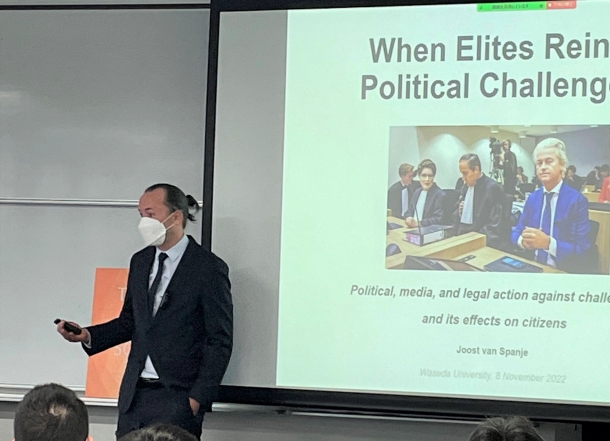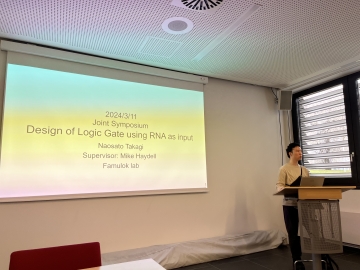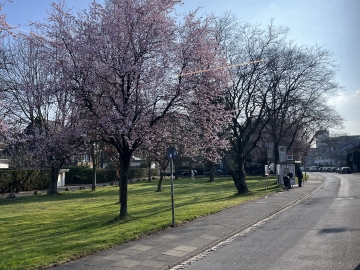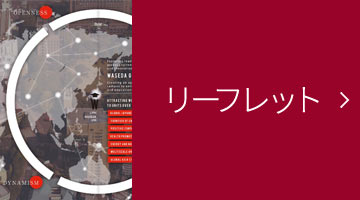2022年11月8日、スーパーグローバル大学創成支援実証政治経済学拠点はロイヤル・ホロウェイ(ロンドン大学)よりヨースト・ファン・スパニエ教授をお招きし、「When elites rein in political challengers: political, media and legal action against challenger parties in mature democracies」と題する特別セミナーにおいて新興政党に関する最新の研究成果をご報告いただきました。
ヨースト・ファン・スパニエ教授は日本学術振興会の外国人招へい研究者として10月、11月の2か月間にわたり早稲田大学政治経済学術院に滞在されました。11月8日のセミナーでは、既成勢力が法律、メディア、政治の3つのアプローチを駆使して新興勢力の台頭を阻止しようとする旨が整理され、これまで収集された多様なデータをもとに分析結果が示されました。参加した多くの学生、研究者と質疑応答が続き、参加者が多くの示唆と学びを得るセミナーとなりました。


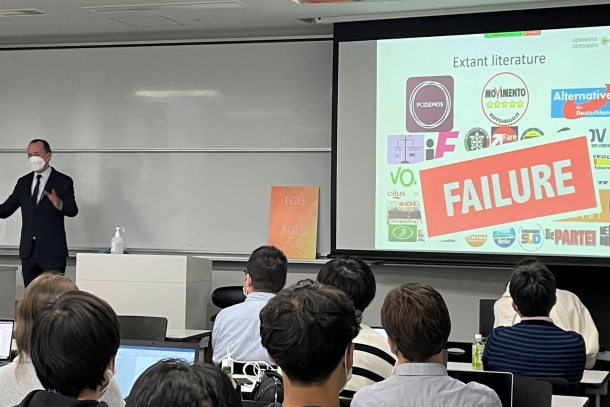
ヨースト・ファン・スパニエ教授のセミナーを受講して
政治学研究科博士後期課程5年 Antonio Benasaglio Berlucchi
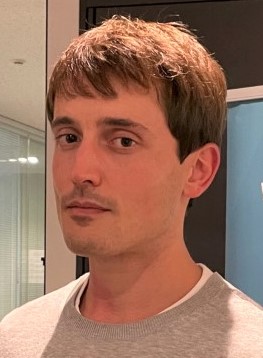 I am Antonio Benasaglio Berlucchi, doctoral student and research associate at Waseda University. My main research interests are elections and voting behavior in advanced liberal democracies and my PhD research focuses on the rise of non-mainstream challenger parties in and outside the European Union. What follows are my impressions regarding Prof. Van Spanje’s talk titled “When elites rein in political challengers: political, media and legal action against challenger parties in mature democracies”.
I am Antonio Benasaglio Berlucchi, doctoral student and research associate at Waseda University. My main research interests are elections and voting behavior in advanced liberal democracies and my PhD research focuses on the rise of non-mainstream challenger parties in and outside the European Union. What follows are my impressions regarding Prof. Van Spanje’s talk titled “When elites rein in political challengers: political, media and legal action against challenger parties in mature democracies”.
The established mainstream parties across advanced democracies are facing new threats that come from both extreme ends of the political spectrum. Against this backdrop, an important question concerns how the established elites react to these challenges and what is the outcome of elite response strategies. How can the Dutch establishment respond to the anti-immigrant rhetoric of Geert Wilders? How do the German mainstream parties address the challenges posed by the far right AFD? How does the public react? The same questions are relevant in other contexts, where far right and anti-immigrant parties have made unprecedented electoral breakthroughs. In his talk, Prof. Van Spanje walked us through the findings of his research on the impact of legal, media and political action against new challengers, where he examines the extent to which elite response affects citizens’ perceived images of parties and leaders and, crucially, how this translates into electoral outcomes.
Mainstream elites may form a cordon sanitaire around new challengers in an attempt to isolate them. Alternatively, they may try to “parrot” their policies and rhetoric to win votes from the extremes or choose to stigmatize their actions. Combining experimental, quasi-experimental and non-experimental designs, Prof. Van Spanje and his research team unveil the impact of different strategies and response options from the judiciary, the established media and mainstream parties. For instance, while media stigmatization of these challengers seems effective in curbing their electoral support, the effects of hate speech trials against key far right political figures reveal that conviction for hate crimes tends to increase public support for the convicted. In addition, these legal actions seem to have negative repercussions in terms of democratic support and hate crime rates among internet users. The different effects found for media and legal reactions were of particular interest to the audience attending the conference and the mechanism through which these effects unfold was further clarified by Prof. Van Spanje during the Q&A.
The last part of the presentation focused on the effects of the different strategies parties adopt to ward off competition from the extremes. A key finding is that imitating challenger parties while simultaneously confining them to the status of pariahs can be effective in preventing threats from far right anti-immigrant parties. Prof. Van Spanje proposed intuitive and convincing explanations for why it is the case: policy-oriented voters have no reason to vote for a pariah challenger with little if any coalition potential, and even more so if the relevant issues emphasized by that challenger are already being addressed by mainstream parties.
By offering new theoretical angles connecting media and electoral studies, Prof. Van Spanje guided us through a fascinating puzzle which, despite the extensive research on challenger parties, is still far from being fully solved. Finally, it is noteworthy that the findings presented by Prof. Van Spanje have important political implications for the future of contemporary democracies: how elite behavior may deter the disruptive impact of far right and anti-immigrant parties will likely affect the quality and stability of demoracy.

ヨースト・ファン・スパニエ 教授(右)と日野 愛郎 教授(左)
